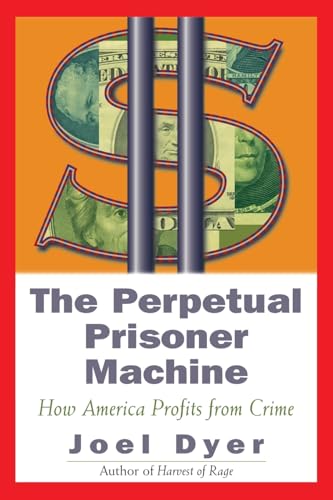Verwandte Artikel zu Perpetual Prisoner Machine: How America Profits from...

Inhaltsangabe
In The Perpetual Prisoner Machine, author Joel Dyer takes a critical look at the United States' criminal justice system as we enter the new millennium. America has more than tripled its prison population since 1980 even though crime rates have been either flat or declining. The U.S. now incarcerates nearly two million people in its prisons and jails on any given day and over five million of its citizens are currently under some form of justice department supervision. These facts raise an obvious question: If crime rates aren't going up, why is the prison population? The Perpetual Prisoner Machine provides the answer to this question and, shockingly, it has little to do with crime or justice. The answer is “profit.”In the 1990s, through their mutual and pension funds, millions of American investors are now unwittingly profiting from crime. As a result of America's controversial push towards the privatization of its justice system, a growing number of well-known and politically influential U.S. Corporations—and subsequently their shareholders—are now cashing in on a prison trade whose profit potential is tied directly to the growth of the prison population. A disturbing realization, when you consider the influence that these same multi-national companies now have over our government's policy-making process by way of their lobbyists and their ability to fill campaign coffers.The Perpetual Prisoner Machine explains how the new prison-industrial complex has capitalized upon the public's fear of crime—which has its origins in violent media content—to help bring about the “hard on crime” policies that have led to our prison-filling, and therefore profitable, “war on crime.” In addition to a quest for profits, Dyer describes an astounding chain of events including media consolidation and globalization, advances in communication technology, and the increasing political dependence upon public opinion polls and campaign funding that have led to the creation of what the author calls “the perpetual prisoner machine,” a mechanism designed to suck the funds from social programs that diminish the crime-enhancing power of poverty and spit them into the bank accounts of those who own stock in the prison-industrial complex.Dyer concludes that powerful, market-driven forces have manipulated America into fighting a very real war against an imaginary foe. “Unfortunately,” says Dyer, “real wars have real casualties. And in this case, the victims are America's poor, particularly those segments of our black and Hispanic population who live in poverty and who now comprise the vast majority of the new human commodity.”
Die Inhaltsangabe kann sich auf eine andere Ausgabe dieses Titels beziehen.
Über die Autorin bzw. den Autor
Joel Dyer is a former editor of Boulder Weekly. His work has been featured in the New York Times, Utne Reader, and numerous other national magazines. He is the author of Harvest of Rage: Why Oklahoma City Is Only the Beginning.
„Über diesen Titel“ kann sich auf eine andere Ausgabe dieses Titels beziehen.
Gebraucht kaufen
Zustand: Sehr gutEUR 3,99 für den Versand von Frankreich nach Deutschland
Versandziele, Kosten & DauerNeu kaufen
Diesen Artikel anzeigenEUR 5,75 für den Versand von Vereinigtes Königreich nach Deutschland
Versandziele, Kosten & DauerSuchergebnisse für Perpetual Prisoner Machine: How America Profits from...
Perpetual Prisoner Machine: How America Profits From Crime
Anbieter: Ammareal, Morangis, Frankreich
Softcover. Zustand: Très bon. Légères traces d'usure sur la couverture. Ammareal reverse jusqu'à 15% du prix net de cet article à des organisations caritatives. ENGLISH DESCRIPTION Book Condition: Used, Very good. Slight signs of wear on the cover. Ammareal gives back up to 15% of this item's net price to charity organizations. Artikel-Nr. D-848-087
Anzahl: 1 verfügbar
Perpetual Prisoner Machine: How America Profits From Crime
Anbieter: BooksRun, Philadelphia, PA, USA
Paperback. Zustand: Good. Ship within 24hrs. Satisfaction 100% guaranteed. APO/FPO addresses supported. Artikel-Nr. 0813338700-11-1
Anzahl: 1 verfügbar
Perpetual Prisoner Machine : How America Profits from Crime
Anbieter: Better World Books, Mishawaka, IN, USA
Zustand: Good. Used book that is in clean, average condition without any missing pages. Artikel-Nr. 5799062-6
Anzahl: 1 verfügbar
Perpetual Prisoner Machine : How America Profits from Crime
Anbieter: Better World Books: West, Reno, NV, USA
Zustand: Good. Former library book; may include library markings. Used book that is in clean, average condition without any missing pages. Artikel-Nr. 5748052-75
Anzahl: 1 verfügbar
Perpetual Prisoner Machine: How America Profits from Crime
Anbieter: ThriftBooks-Dallas, Dallas, TX, USA
Paperback. Zustand: Very Good. No Jacket. May have limited writing in cover pages. Pages are unmarked. ~ ThriftBooks: Read More, Spend Less 1.1. Artikel-Nr. G0813338700I4N00
Anzahl: 1 verfügbar
Perpetual Prisoner Machine: How America Profits from Crime
Anbieter: ThriftBooks-Phoenix, Phoenix, AZ, USA
Paperback. Zustand: Very Good. No Jacket. May have limited writing in cover pages. Pages are unmarked. ~ ThriftBooks: Read More, Spend Less 1.1. Artikel-Nr. G0813338700I4N00
Anzahl: 1 verfügbar
Perpetual Prisoner Machine: How America Profits From Crime
Anbieter: Wonder Book, Frederick, MD, USA
Zustand: Good. Good condition. With remainder mark. A copy that has been read but remains intact. May contain markings such as bookplates, stamps, limited notes and highlighting, or a few light stains. Bundled media such as CDs, DVDs, floppy disks or access codes may not be included. Artikel-Nr. D05L-00635
Anzahl: 1 verfügbar
Perpetual Prisoner Machine: How America Profits From Crime
Anbieter: Wonder Book, Frederick, MD, USA
Zustand: Very Good. Very Good condition. A copy that may have a few cosmetic defects. May also contain light spine creasing or a few markings such as an owner's name, short gifter's inscription or light stamp. Artikel-Nr. Y10L-01594
Anzahl: 1 verfügbar
Perpetual Prisoner Machine: How America Profits From Crime
Anbieter: Ria Christie Collections, Uxbridge, Vereinigtes Königreich
Zustand: New. In. Artikel-Nr. ria9780813338705_new
Anzahl: Mehr als 20 verfügbar
Perpetual Prisoner Machine
Anbieter: moluna, Greven, Deutschland
Zustand: New. A critical look at the United States criminal justice system, raising an obvious question: If crime rates aren t going up, why is the prison population?Über den AutorJoel Dyer is a former editor of Boulder Weekly. His work has . Artikel-Nr. 776328436
Anzahl: Mehr als 20 verfügbar

